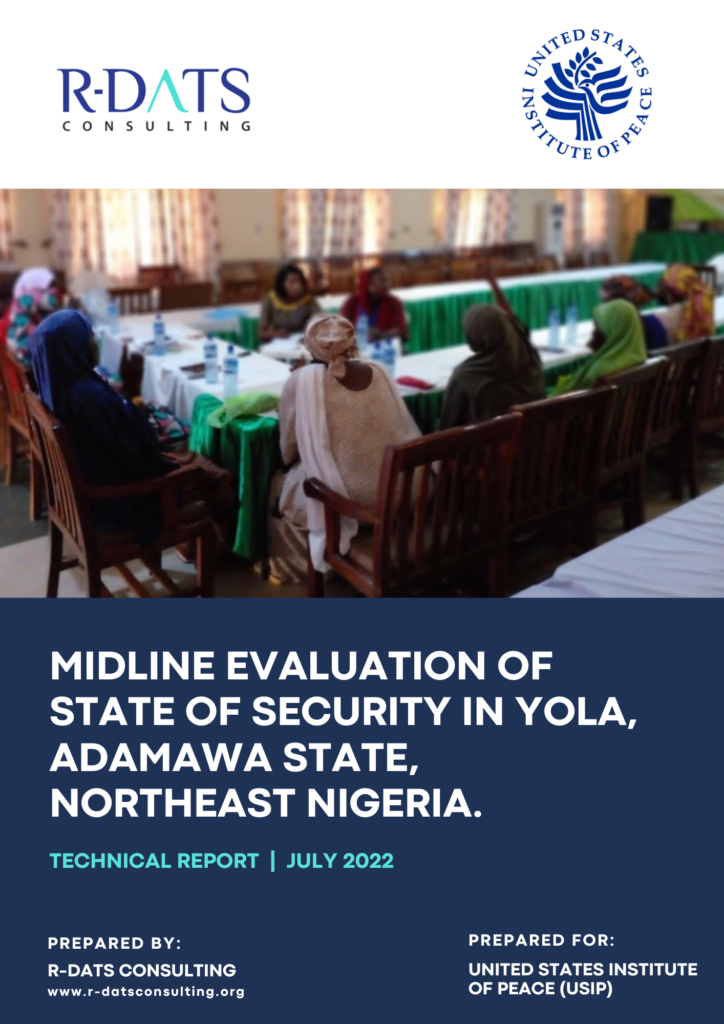Evaluation of the Justice and Security Dialogue (JSD) Project in Northeast Nigeria – Baseline and Follow-up
The Justice and Security Dialogues (JSD) project in Nigeria, operates in the northeast of the country specially Adamawa State. Adamawa continues to experience security loopholes including non-state armed groups’ (NSAG attacks and clashes with Government Forces). Despite Government forces continued offensive/counter, there has been a significant increase in the threats of attacks on both civilian and military locations and convoys across the state. The baseline and follow-up for this project was conducted in 2021 and 2022 respectively.
The baseline assessment was guided by the following objectives:
1. Assess the knowledge and attitudes of engagement with security services through the following lenses:
- By assessing the knowledge of community members on how to contact and engage with security services and/or government officials – (we will work with them to map out the security facilities and services, and assess their knowledge on how to engage these services)
- Understanding their attitudes towards community engagement in security provision. – community perceptions on security provisions, effectiveness of services, the motivations and barriers for engagement, and perception of trust in these services.
2. Understand the capacity of community members to demand and engage in improving security in their communities by exploring:
- Participants understanding of security roles and responsibilities in security provision, community roles and responsibilities, and explore influences of different members.
- Community members’ abilities to demand for improved security provision from security services and government.
- Capacity of participants to constructively engage in improving security in their communities.
Whilst the follow-up assessment was guided by the following objectives:
1. Understand current perceptions of security provision:
- IDPs and community members current perceptions of security service responsiveness, effectiveness, and trust.
- Security service current perceptions of community members and IDPs
2. Determine the current level of understanding about security service provision:
- IDPs and community members current understanding of security roles and responsibilities.
- IDPs and community members current knowledge on how to contact and engage with security services and/or government officials; and
- IDPs and community members current ability to demand improved security provision from security services and government.
- Security service perception of community members current understanding of their roles and responsibilities, engagement, and accountability.
3. Current positive engagement in security provision:
- IDPs and community members engagement with security services; and
- Security services’ attitude toward community engagement in security provision.
R-DATS’ roles and responsibilities
R-DATS Consulting was contracted by USIP to carry out the assessment and evaluation (baseline and follow-up) of Justice and Security Dialogue (JSD) project in Northeastern Nigeria. Specifically, R-DATS was contracted to do the following:
- Develop the protocols for and carry out eight (8) focus group discussions (FGDs) and up to ten (10) key informant interviews (KIIs) with security sector personnel in Yola, Adamawa, Nigeria.
- Develop a structured interview protocol USIP and its implementing partners may use with program participants to monitor the efficacy of their programming over time.
- Develop conflict-sensitive FGD and KII protocols to meet USIP monitoring and evaluation needs in close consultation with the JSD team and the Learning, Evaluation, and Research (LER) team.
- Arrange for all FGD recruitment, transportation, refreshments, and rental of rooms for FGDs.
- Audio record all KIIs and FGDs and submit all transcripts of KIIs and FGDs to USIP in the languages in which they were consulted and with their English translations within the week they are conducted.
- Produce an internally-facing final report summarizing findings from the FGDs and the KIIs.
OVERVIEW
Partner:
United States Institute of Peace (USIP)
Sector:
Security, Peace, Reconciliation, Humanitarian, IDP
Themes:
Security services, community perceptions
Country:
Nigeria
Study type/method:
Qualitative research
Implementation period:
2021 (Baseline), 2022 (follow-up)
Sample Size:
9 FGDs, 10 KIIs for each evaluation cycle
Implementation status:
Completed

